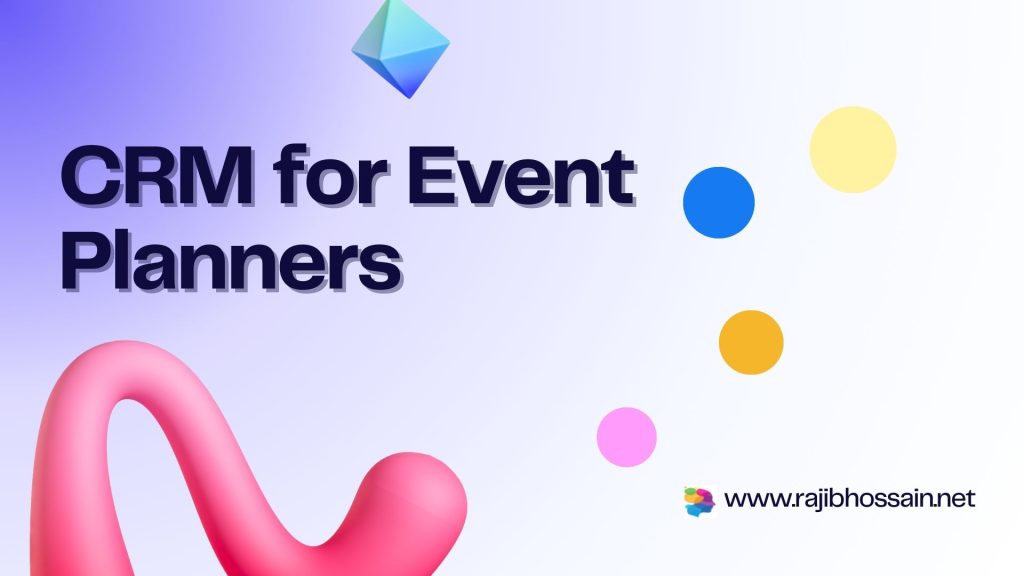
Event planners handle a myriad of tasks, from coordinating logistics to managing client communications and ensuring successful events. A robust Customer Relationship Management (CRM) system can help streamline these processes, improve communication, and ensure client satisfaction. This article explores the benefits of CRM for event planners, and key features to consider, and answers common questions about using CRM in the event planning industry.
Why Event Planners Need CRM Systems
Event planners face the challenge of managing numerous details, coordinating with various stakeholders, and ensuring seamless event execution. CRM systems offer several advantages:
- Improved Client Management: Centralized client information, including contact details, event preferences, and communication history.
- Enhanced Communication: Automated communication tools for sending event updates, reminders, and follow-ups.
- Streamlined Event Coordination: Tools for managing event logistics, schedules, and resources.
- Data Analytics: Insights into event performance, attendee engagement, and client satisfaction.
- Marketing Automation: Tools for promoting events, managing registrations, and tracking marketing campaigns.
- Post-Event Follow-Up: Efficient management of post-event surveys, feedback, and future engagement.
Essential Features of CRM for Event Planners
When selecting a CRM for event planning, consider the following features:
- Client Management: Centralized database for client records, event preferences, and communication history.
- Event Coordination Tools: Tools for managing event logistics, schedules, and resources.
- Communication Tools: Email and SMS capabilities for sending event updates, reminders, and follow-ups.
- Marketing Automation: Tools for promoting events, managing registrations, and tracking marketing campaigns.
- Analytics and Reporting: Detailed reports on event performance, attendee engagement, and client satisfaction.
- Integration: Compatibility with other event management software such as ticketing and registration systems.
- Customization: Ability to tailor the CRM to meet the specific needs of the event planning business.
- Mobile Access: Access to CRM data on the go through mobile apps.
- Security: Robust security features to protect sensitive client and event information.
Top CRM Systems for Event Planners
Here are some of the best CRM systems tailored for event planning:
- Salesforce Event Management
- Features: Comprehensive client management, event coordination tools, communication tools, and analytics.
- Pros: Highly customizable, robust integration with other event management software.
- Cons: Higher cost, may require significant customization for small businesses.
- Pricing: Custom pricing based on business size and requirements.
- HubSpot CRM
- Features: Client management, event coordination tools, communication tools, and marketing automation.
- Pros: User-friendly, free plan available, customizable.
- Cons: Limited event-specific features compared to specialized CRMs.
- Pricing: Free plan available; premium plans start at $50 per user per month.
- Zoho CRM
- Features: Client management, event coordination tools, communication tools, and analytics.
- Pros: Affordable, user-friendly, customizable.
- Cons: Limited integration options compared to broader CRM platforms.
- Pricing: Starts at $12 per user per month.
- Eventbrite
- Features: Client management, ticketing and registration, communication tools, and analytics.
- Pros: Designed specifically for event management, strong ticketing and registration tools.
- Cons: Can be expensive for smaller businesses.
- Pricing: Custom pricing based on business size and requirements.
FAQs
Q1: Is a CRM system necessary for small event-planning businesses?
- A: While not essential, a CRM system can significantly improve client management, communication, and operational efficiency, even for small businesses.
Q2: How do CRMs ensure client data security?
- A: CRMs for event planning are designed to comply with data protection regulations, featuring robust encryption, access controls, and regular security audits.
Q3: Can a CRM system integrate with existing event management software?
- A: Many CRMs offer integration capabilities with popular event management software such as ticketing and registration systems, ensuring seamless data transfer and workflow.
Q4: What are the initial steps to implement a CRM in an event planning business?
- A: Identify your business’s specific needs, choose a CRM that meets those needs, train staff on its use, and gradually integrate it into your daily operations.
Conclusion
Implementing a CRM system in an event planning business can enhance client management, improve communication, and streamline event coordination, allowing event planners to focus more on delivering successful events. By selecting a CRM with the right features and ensuring it meets regulatory requirements, event planning businesses can boost their operational efficiency and client satisfaction.
